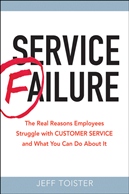Undercover Boss explores the dark underworld of fulfillment
 Jeff Toister
Jeff Toister  Monday, March 22, 2010 at 8:24AM |
Monday, March 22, 2010 at 8:24AM |  This week's episode of Undercover Boss gives us a behind the scenes look at a call center and fulfillment operation when they follow Michael Rubin, CEO of GSI Commerce. GSI Commerce provides outsourced sales and fulfillment services for companies like the NFL. If you order a jersey from NFL.com, it's actually GSI Commerce that takes your order and ships the merchandise to you. Most of us have ordered something online, via a catalog, or through a 1-800 number, but few of us have given much thought about what it takes to get the order to you.
This week's episode of Undercover Boss gives us a behind the scenes look at a call center and fulfillment operation when they follow Michael Rubin, CEO of GSI Commerce. GSI Commerce provides outsourced sales and fulfillment services for companies like the NFL. If you order a jersey from NFL.com, it's actually GSI Commerce that takes your order and ships the merchandise to you. Most of us have ordered something online, via a catalog, or through a 1-800 number, but few of us have given much thought about what it takes to get the order to you.
Watch the episode first if you don't want me to spoil the plot.
Today's fulfillment operations are driven by technology, but the industry is still plagued by outdated management practices and a 'productivity before customers' philosophy. I was anxious to see what happened on this show and wasn't at all disappointed! As always, a few major lessons emerged.
Are executives workaholics or just lazy?
The executives on Undercover Boss have had a lot of trouble doing labor-intensive jobs on this show. They are often portrayed as 'workaholics', but time after time they struggle to perform manual labor at pace that matches their own company standards. In this episode, Michael got 'fired' from a packing line because he made too many errors and was boxing up orders at about half the required rate. He was also admonished by another supervisor for slow and sloppy work when he was loading boxes into a truck while a temporary worker with just three weeks on the job left him in the dust.
I don't really think most executives are lazy, but I do think they suffer from a lack of focus. A former boss (who was the company President) once told me that management was like being the plate spinner from the old variety shows, where a guy would frantically keep about 50 plates spinning on sticks without letting any of them crash. A lot of us can relate to that analogy, but the problem is keeping 50 plates spinning means that no particular plate is spinning very well. When the undercover bosses do a labor-intensive job they seem to struggle having only one job to do very well and very fast.
Hire for attitude, train for skill
Every episode of Undercover Boss has highlighted the importance of attitude. This show compared two customer service agents in the 'Escalations' department who spent their days handling upset customers. Adam wore a big smile and made pleasing his customers his number one priority. Danielle did the same job, but her attitude was focused on gaining customer compliance. At one point she instructed Michael to "sound confident and put her in her place" when advising him on how to handle an angry customer.
Designed to Fail
The processes and training programs in many fulfillment operations are unintentionally designed to fail. They yield mediocre results, create high turnover rates, and prevent employees from living up to their potential. This week's episode highlighted several examples.
Danielle, the Escalations operator, was inexcusably rude to a customer in one scene. It's easy to write this off as a lack of common sense or simply a poor attitude, but you can also see Danielle wasn't put in a position to succeed. The customer was upset because she was told she'd have to pay $149 for a $99 item due to an error made by GSI Commerce and could only get a $50 credit after she was charged and the order had shipped. The right thing to do would be to charge the customer $99, but Danielle didn't have the ability or the authority to do that. She was put in the unenviable position of enforcing a poor policy (get the customer to pay $50 extra and receive a credit later) while still keeping the customer happy. In this case, the customer refused to pay extra, so Danielle chose to enforce the policy since her job was more important than the customer.
Michael, the CEO, struggled with several of the warehouse jobs. He certainly could have worked harder, but he was given very little training and very little chance to succeed. Any new skill, no matter how simple, takes time to develop. When he was stacking boxes, he was expected to go at full speed from the beginning, but he struggle to keep up with the speed and the proper technique of stacking the boxes tightly. The focus should have first been on proper stacking while gradually building the required speed. When he got 'fired' from the packing job, he had been working in the position for only a few hours.
My company designs training programs for call centers and fulfillment operations. One of the philosophies we use is "train slow to work fast". The idea is to provide employees with complete and appropriate training so they actually work faster and with fewer errors once they are trained. It seems a bit counterintuitive at first, but I've discovered that a lot of business secrets are counterintuitive.
Did you watch the show? What did you think? As always, your comments are welcome!




Reader Comments (5)
Hi, this is Danielle. I think that you are not informed well at all on what happened with the call, and how Mr Rubin handled things. The entire call was not played. I am from a collections background. I agree that he should not have wanted to fire me on the spot, and he did not take the time to know me, and what was going on. I did lack complete training, but had been with the company in customer service in sales for about 4 months at the time, with a great customer service record. I was moved into escalations a couple weeks prior to taping, and was not aware that we had the ability to create credits, and was not advised of it during the call with the chat feature. I was not fired, or released from duty due to the issue you saw on tv. I was with the company until 2nd week of March. I did demote myself in January back to the customer sales and service, where I maintained 100% grades on my calls. There was no retraining provided as stated either.
Customer service isn't for everyone. I've worked CS jobs in the past, and honestly, I HATE them. Often companies don't provide the resources to their reps to adequately solve the customer's problem, so CS agents are left with no tools to satifsy the customers and then penalized for "not making the customer happy." Granted, there is a certain personality perfect for CS, which I don't have. When someone calls me up and starts screaming, $10/hr. ain't gonna keep a smile on my face.
And frankly, I just don't care that much about the customers' problems. Which is why I will never work in CS again. Those days are left behind in my college years, where they will stay.
Also, I thought Danielle was hilarious. I probably would have hung up on the customer LONG before the customer hung up on me, and then claimed my phone "dropped the call."
Thanks for the comments, Danielle and Sarah. I've been there myself and know first hand that these types of jobs can often be thankless and difficult (both the jobs AND the customers!).
I have no doubt that there was plenty edited out of the show, but it also reinforces a few fundamentals for customer service call centers. (1) Companies should hire people that really LIKE that type of job. (2) Companies should provide adequate training (to Danielle's point) so reps clearly know what to do and how to do it. (3) Companies should create systems and policies that don't put people in impossible positions.
Jeff, Thank you for your insightful post about this episode of Undercover Boss. You not only correctly identified the differences in the CS handling by Adam (positive, and his goal: customer satisfaction) and Danielle (negative, and her goal: "customer compliance"), but you also identified problems in processes and training that you say led to Danielle's response to her customer. I still believe she could have (and should have) handled that call differently.
I'd like to point out that after the show aired, Danielle copied and pasted that same response that she posted here on several blogs and news sites, word for word, demonstrating that she's concerned only about defending herself and not learning from posts like yours. She doesn't get it.
Reader Sarah (above) also doesn't get it; her ethics in proposing that she would claim a call was "dropped' when she would instead hang up on a customer are appalling. Treating others how you want to be treated is not complicated; nor does it take a "certain personality." It's about choice, it's about attitude, it's about motivation, it's about character--no matter what hourly rate you get paid.
Your post offers concrete insights on how management can improve processes so CS teams can better do their jobs. There's always room for improvement, from the top as well as from the floor. However, as I understood the incident, the customer had ordered a GPS unit for $99.99 but a problem in the system charged her $149.99; the only remedy they could offer was to let her reorder the unit and they would issue a credit for $49.99 within 24 to 48 hours. Rubin had begun to explain to the customer that she would indeed receive this credit (as he led off by saying, "Well, I have partly good news..." knowing that she, the customer, would ultimately get satisfaction), but Danielle pulled him off the call, telling him he wasn't sounding "confident" enough and needed to "put her [the customer] in her place." That's when Danielle jumped on the call and proceeded to punish the customer, denigrating and frustrating her further, which escalated an already escalated call! Not good. She could have reached "customer compliance" through patient, compassionate techniques rather than the belittling, punitive position she chose to convey.
But Jeff, you've identified issues that could improve the chances for success for CS representatives. For that, I applaud you. Thanks for your thoughtful insights on this issue.
K. Gollnick. Thanks for your comment and I'm glad you liked the post!